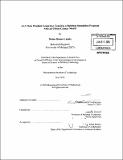An urban weather generator coupling a building simulation program with an urban canopy model
Author(s)
Bueno Unzeta, Bruno
DownloadFull printable version (16.84Mb)
Other Contributors
Massachusetts Institute of Technology. Dept. of Architecture.
Advisor
Leslie K. Norford.
Terms of use
Metadata
Show full item recordAbstract
The increase in air temperature observed in urban environments compared to the undeveloped rural surroundings, known as the Urban Heat Island (UHI) effect, is being intensely studied, due to its adverse environmental and economic impacts. Some of the causes of the UHI effect are related to the interactions between buildings and the urban environment. This thesis presents a methodology intended to integrate building energy and urban climate studies for the first time. It is based on the premise that at the same time buildings are affected by their urban environment, the urban climate is affected by the energy performance of buildings. To predict this reciprocal interaction, the developed methodology couples a detailed building simulation program, EnergyPlus, with a physically based urban canopy model, the Town Energy Balance (TEB). Both modeling tools are leading their respective fields of study. The Urban Weather Generator (UWG) methodology presented in this thesis is a transformation of meteorological information from a weather station located in an open area to a particular urban location. The UWG methodology fulfils two important needs. First, it is able to simulate the energy performance of buildings taking into account site-specific urban weather conditions. Second, it proposes a building parameterization for urban canopy models that takes advantage of the modelling experience of a state-of-the-art building simulation program. This thesis also presents the application of the UWG methodology to a new urban area, Masdar (Abu Dhabi). The UHI effect produced in this hot and arid climate by an urban canyon configuration and its impact on the energy performance of buildings are analyzed.
Description
Thesis (S.M. in Building Technology)--Massachusetts Institute of Technology, Dept. of Architecture, 2010. Cataloged from PDF version of thesis. Includes bibliographical references (p. 125-128).
Date issued
2010Department
Massachusetts Institute of Technology. Department of ArchitecturePublisher
Massachusetts Institute of Technology
Keywords
Architecture.